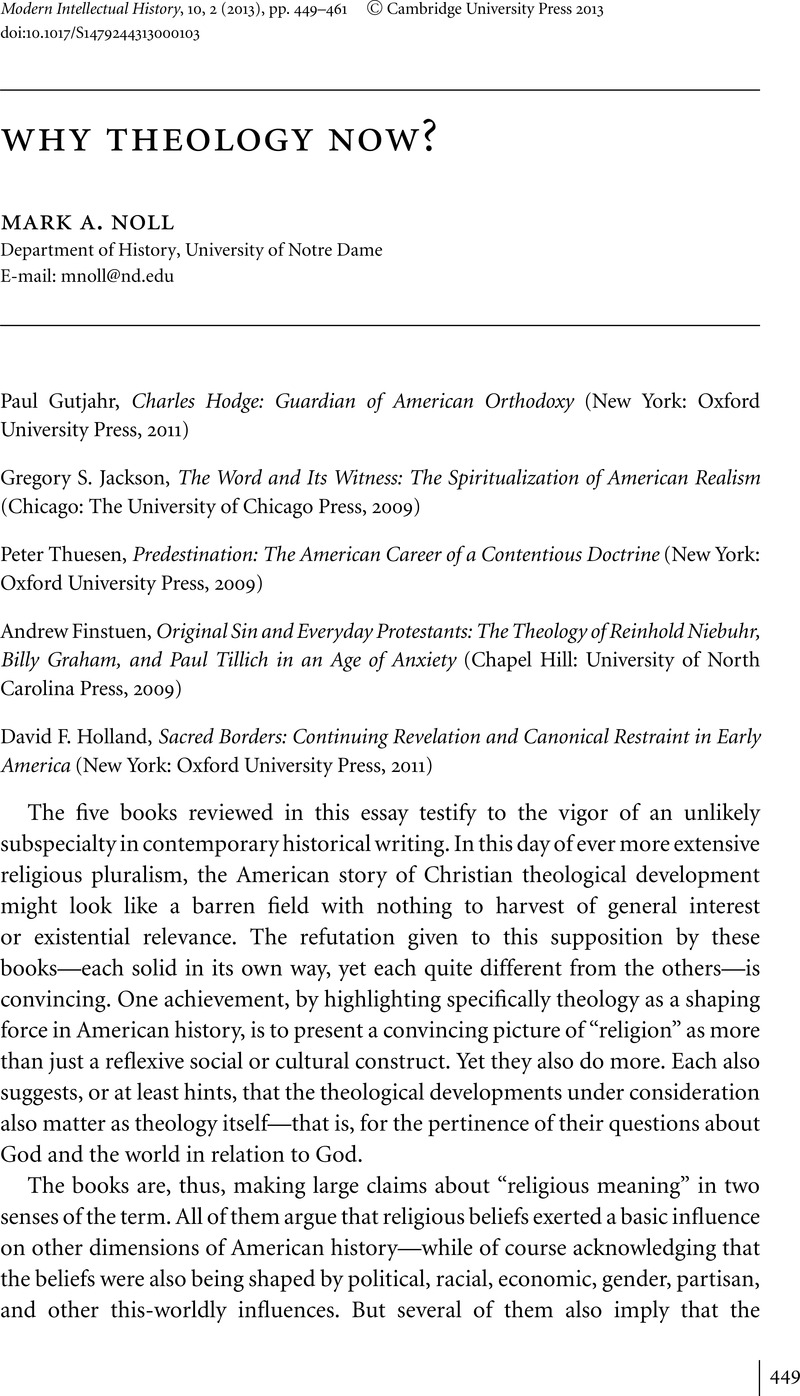No CrossRef data available.
Article contents
WHY THEOLOGY NOW?
Review products
Published online by Cambridge University Press: 11 July 2013
Abstract

- Type
- Review Essays
- Information
- Copyright
- Copyright © Cambridge University Press 2013
References
1 Diggins, John Patrick, Why Niebuhr Now? (Chicago: The University of Chicago Press, 2011)CrossRefGoogle Scholar.
2 Hodge, A. A., The Life of Charles Hodge (New York: Charles Scribner's Sons, 1880)Google Scholar. A sign of Hodge's continued relevance is the fact that a second well-researched biography was published late in 2011—Hoffecker, Andrew, Charles Hodge: The Pride of Princeton (Phillipsburg, NJ: P&R Publishing, 2011)Google Scholar.
3 Thuesen, Peter, Predestination: The American Career of a Contentious Doctrine (New York: Oxford University Press, 2009), 180CrossRefGoogle Scholar.
4 Criticism on this score appears frequently in Charles Hodge Revisited, ed. John W. Stewart and James M. Moorhead (Grand Rapids: Eerdmans, 2002).
5 Haroutunian, Joseph, Piety versus Moralism: The Passing of the New England Theology (New York: Henry Holt, 1932)Google Scholar; Niebuhr, H. Richard, The Kingdom of God in America (New York: Harper, 1937)Google Scholar; Morgan, E. S., The Puritan Dilemma: The Story of John Winthrop (Boston: Little, Brown, 1958)Google Scholar; several essays in Miller, Perry, Errand into the Wilderness (Cambridge, MA: Harvard University Press, 1956)Google Scholar; May, Henry F., “The Recovery of American Religious History,” American Historical Review 70 (Oct. 1964), 79–92Google Scholar; Howe, Daniel Walker, The Political Culture of the American Whigs (Chicago: The University of Chicago Press, 1979)Google Scholar.
6 The Works of Jonathan Edwards, eds. Perry Miller, Harry S. Stout, et al. (New Haven: Yale University Press, 1957–); and as a leading example, Marsden, George M., Jonathan Edwards: A Life (New Haven: Yale University Press, 2003)Google Scholar. The Papers of Martin Luther King, Jr., ed. Clayborne Carson et al. (Berkeley: University of California Press, 1992–); and as a leading example, Chappell, David L., A Stone of Hope: Prophetic Religion and the Death of Jim Crow (Chapel Hill: University of North Carolina Press, 2004)CrossRefGoogle Scholar.
7 As only a few examples: Curtis, Heather D., Faith in the Great Physician: Suffering and Divine Healing in American Culture, 1860–1900 (Baltimore: Johns Hopkins University Press, 2007)Google Scholar; Valeri, Mark, Heavenly Merchandize: How Religion Shaped Commerce in Puritan America (Princeton: Princeton University Press, 2010)CrossRefGoogle Scholar; Rable, George C., God's Almost Chosen People: A Religious History of the American Civil War (Chapel Hill: University of North Carolina Press, 2011)Google Scholar; Hall, David D., A Reforming People: Puritans and the Transformation of Public Life in New England (New York: Knopf, 2011)Google Scholar.


